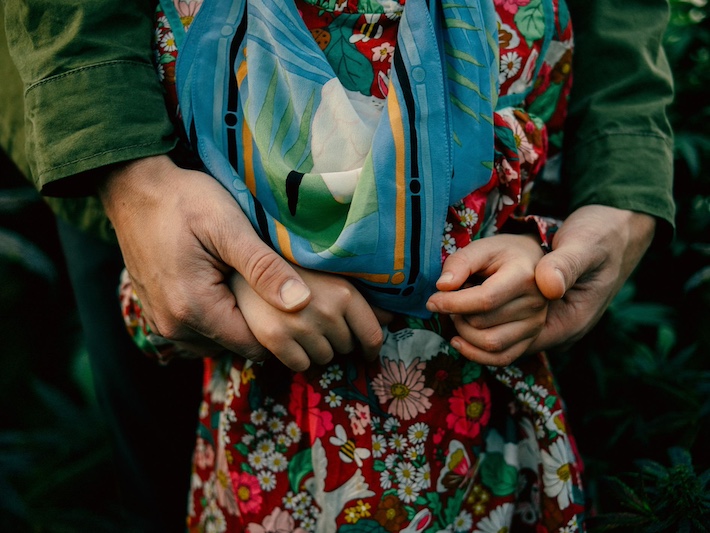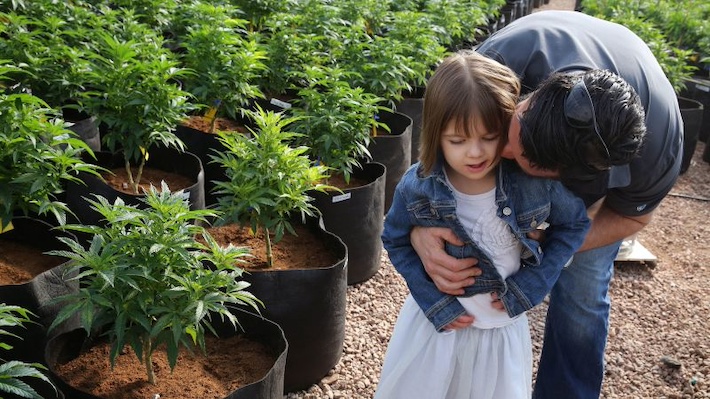CBD wouldn’t be where it is today without Charlotte Figi. It’s hard to imagine today, but CBD was once as maligned as marijuana with little consideration given to its medical benefits.
It was only through the bravery of a young girl dealing with a rare seizure condition that the cannabinoid started to be seen for what it was: a non-intoxicating and medically beneficial compound.
Charlotte unfortunately passed away from complications relating to COVID-19 in April 2020, but her legacy lives on and her story inspires us all to this day.
You could argue that the whole CBD industry has her to thank, but her mother, Paige Figi, alongside Heather Jackson, founded Realm of Caring in 2013 specifically to help other people learn about the benefits of CBD and cannabis.
In the decade since its founding, Realm of Caring has helped over 73,000 patients and helped to change the law in a massive 22 states.
The story of Charlotte Figi and her family is an inspiration for any CBD advocate, and we talked to Realm of Caring’s executive director Sasha Kalcheff-Korn about how the organization carries on Charlotte’s legacy.
“A reported 50 million individuals across the globe are living with epilepsy.” Kalcheff-Korn emphasized, “Charlotte’s story of reclaiming a quality of life from pediatric epilepsy with cannabinoid therapy sparked a movement to showcase the power of plant as a natural solution.”
Charlotte’s Story
Charlotte Figi had her first seizure when she was just 3 months old. Until then, she’d led a regular life alongside her twin sister Chase and her older brother Max, all living with her parents Matt and Paige in Colorado.

The seizure came just after Charlotte came out of the bath, as Matt was putting on her diaper. He explained to CNN that, “She was laying on her back on the floor, and her eyes just started flickering.” They rushed her to the hospital, but the doctors’ tests revealed nothing and they assumed it was a one-off.
Unfortunately, that was not the case. She had another, longer seizure the next week, and many more over the coming months. Matt Figi told Cannabis Patient Care she began to have around one seizure a month through her first year of life.
The doctors were still stumped, though, with tests and scans showing no apparent problems. But with such regular and worsening seizures, she was starting to spend more and more time in the hospital with each episode and was taking many pharmaceutical drugs. Until age 2, she was developing normally, but the seizures and the medications – including barbiturates and benzodiazepines – started to take their toll.
Her mother Paige said to CNN, “At 2, she really started to decline cognitively. Whether it was the medicines or the seizures, it was happening, it was obvious. And she was slipping away.”
Getting the Diagnosis and Living With Dravet Syndrome
The Figis took her to the Children’s Hospital Colorado when she was 2 and a half. The neurologist had her tested for the SCN1A gene mutation, which is present in four out of five cases of Dravet Syndrome.
Dravet Syndrome is a type of epilepsy that starts in young children, with the first seizure often coming before one year of age. The symptoms can vary from mild to severe, and after one year of age, and can include myoclonic seizures (uncontrollable rapid spasms) and status epilepticus (a seizure that lasts 5 minutes, or multiple seizures within a 5-minute period with no normal consciousness between).
Dravet syndrome is called “intractable,” because the seizures cannot be easily controlled by medication.
Charlotte’s genetic test came back positive two months later. Paige said it was a relief just to know, and Matt, a Green Beret, left the military to help with their daughter. They started Charlotte on a ketogenic diet on the advice of a specialist in Dravet Syndrome, but despite some success controlling her seizures, it led to bone loss and problems with her immune system.

After two years on the diet, the seizures started to come back and things got worse. Charlotte was having 300 grand mal seizures per week – about every 20 minutes – and she couldn’t walk, talk or eat. Doctors even suggested putting her in a medically-induced coma to allow her time to recover from the constant seizures.
At age 5, the hospital basically told the Figis there was nothing more they could do.
Discovering CBD
Matt was working as a military contractor in Afghanistan – a few months on the job, then a few back home caring for Charlotte and his family – when he saw something that would come to change their lives.
It was the story of Dravet sufferer Jayden David and his father Jason, who used CBD to treat the condition and successfully reduce the seizures. He immediately called Paige and asked that she try to make it happen for Charlotte.
In 2012, this was only possible through Colorado’s medical marijuana program, and the then five-year old Charlotte would have been the youngest patient in the whole program.
Paige set to work, and after many rejections, found two doctors who were able to sign off on Charlotte trying out CBD for her condition. In particular, they made the crucial point that the family had exhausted all other treatment options.
They took a trip to Denver to pick up a high-CBD strain and a friend helped them make it into a tincture. Paige commented to us, “We were pioneering the whole thing; we were guinea pigging Charlotte. This is a federally illegal substance. I was terrified to be honest with you.”
After they started using it, she went seven days without a seizure for the first time “in longer than I could possibly remember,” recalls Matt.
Bolstered by the initial success, they were introduced to medical cannabis growers the Stanley Brothers, who were struggling to sell a CBD-heavy strain called “Hippie’s disappointment” because it was so low in THC. For the Figis, it was exactly what they were looking for.
Later, the Stanley Brothers renamed the company Charlotte’s Web in her honor, and it still remains one of the top CBD companies around today.
Matt did explain that the CBD did not stop the seizures entirely, but the huge impact it had was enough to transform her life, “She went from having 300 tonic-clonic seizures each week to maybe 1-3 a month. This treatment allowed for so many things to happen. It allowed her to get her quality of life back. She started walking and talking again. It allowed her to start eating on her own again. Then over time, we took her wheelchair and we hung it up on a hook in the garage because she didn’t need it anymore. She started riding her bicycle again.”
Sanjay Gupta and the CNN Documentary Weed
Although Charlotte’s life had already been transformed by CBD, there were many people across the country who did not know about the cannabinoid’s potential.
While they started to get interview requests from many local news outlets, they were wary of just accepting any request and wanted to make sure they chose the right opportunity. When CNN contacted the Figis about a possible interview with Dr. Sanjay Gupta, they knew it was the opportunity they’d been waiting for.
Dr. Gupta and the CNN team went out to the Figis’ home in Colorado for a week, filming every day and interviewing both Matt and Paige about their experience. Dr. Gupta read Charlotte’s favorite story to her, with Matt commenting that “He literally brought us to tears, in a good way.”
The docuseries Weed was finally released in 2013 and the impact of it is ultimately still being felt today. As well as shining a light on Charlotte’s inspiring story, at the time the country was much more skeptical of medical cannabis and CBD than it is today.

Along with the documentary, his experience with Charlotte and others led Dr. Gupta to completely change his mind about medical cannabis, publicly coming out in favor of it.
Sasha Kalcheff-Korn commented to us, “The world watched Charlotte’s story through Dr. Sanjay Gupta’s expert eyes. This created the ultimate shift about how we think and talk about the plant itself, but more specifically CBD.”
While Dr. Sanjay Gupta is just one person, as one of the most recognizable doctors in the country, his change of view had a big impact on public perception of cannabis and CBD. But alongside this, Charlotte’s story was given a bigger platform and resonated with both people whose children suffered from conditions like Dravet syndrome and many others who simply saw the massive value CBD oil had for her.
Tragically, Charlotte passed away on April 7th, 2020 at age 13, likely as a result of COVID complications. However, her legacy lives on today.

Realm of Caring: The Organization Carrying Forward Charlotte’s Legacy
Realm of Caring was founded in 2013, by Paige Figi and Heather Jackson, with the aim of providing information about cannabinoid therapies and helping people in need get access.
To date, they boast over 73,000 clients receiving one-on-one support, 5,000 people participating in their Observational Research Registry and having helped lawmakers in 22 states pass cannabis legislation.
Executive director Sasha Kalcheff-Korn stressed Charlotte’s continuing influence on Realm of Caring, “Charlotte’s impact remains the footprint of our path forward. We have created a worldwide community where access to plant-based therapies is the cornerstone of helping others. Charlotte’s fight paved the foundation for research, education, and impact; our mission carries on her light and legacy through funding research, providing free education, and elevating community voices that change lives and open minds.”
Realm of Caring is focused on educating consumers and supporting research into cannabinoid therapies, first and foremost. They do this in many ways, and have a wealth of information accessible on their website if you sign up for a free account.
This includes useful guides like a dosing calculator and a series of webinars covering a multitude of topics from basics like how to get started to more specific issues like the use of cannabinoids for pain.
However, if you need information tailored to your needs, you can contact their care team directly and get one-on-one support. You can send an email, but there is also a hotline and the option to get an appointment for a consultation in either English or Spanish.
This is only the tip of the iceberg, though, because Realm of Caring also works hard to conduct research and maintains a research library to help people get the information they need. They have worked on many pieces of research that are very useful to CBD users, with a recent example addressing the issue of drug testing for people taking full spectrum hemp extracts daily. Clients can also join the observational research registry (ORR) to help build the evidence base around CBD and its impacts on users.
With this multi-pronged approach – providing information, consulting with patients one-on-one and conducting research – Realm of Caring is trying to bring the benefits of CBD and cannabinoids that Charlotte popularized to people all across the country, and even around the world.
Stigma and Misinformation: The Major Hurdles Still Standing in CBD’s Way
One of the most striking things about Charlotte’s story when reading it in 2024 is the amount of difficulty the Figis had in getting access to CBD.
Paige had to go to many doctors before she was able to find two to sign off on Charlotte’s treatment, and many other parents back then would have simply taken no for an answer and never got the CBD.
We asked Sasha Kalcheff-Korn whether or not the same stigma faced by Paige is still present today. She said, “Yes, doctors are still hesitant, but there is a real issue with access to education here. The Endocannabinoid System (ECS) is not taught in medical school. We’re seeing a change with this as there are now cannabis programs for nurses, but this is largely left out of medical discussion. We also have hospital systems whose policies prohibit them from discussing cannabis use – whether that be CBD or THC.”
And this is another big benefit of having an organization like Realm of Caring, there to educate both patients and healthcare practitioners through their Practitioner Education Series. This gives doctors the crucial information they need and covers many of the key questions they may have as well as addressing specific conditions in detail.
Kalcheff-Korn continued, “And lastly, we have a lot of misinformation out there. People are still afraid of the plant, but we have decades of stigma to erase. Parents want to do what is best for their kids and without support from their medical team, community, state representatives/senators, or access to knowledge and/or quality products – that can make it challenging for them.”
Adding, “This is exactly why Realm of Caring started, to bridge that gap and help get this information to parents and individuals so they have some autonomy when it comes to their health.”
So while we’re all lucky, in a sense, that Charlotte’s story has helped to teach many doctors and much of the population that CBD is not “marijuana” and can be incredibly helpful in some situations, issues still remain.
Misinformation is still rife, and as Kalcheff-Korn pointed out, while Charlotte’s story was the start of a true shift in perspective, there is decades’ worth of stigma to break down.
For both of these issues, along with Realm of Caring and other organizations, we as advocates can help to break down these barriers and help people learn the facts. Even something as simple as talking to people about your own personal experience with CBD can make a huge difference.
Charlotte may have started this important process, but we can all support her legacy and carry on this work.
What’s Next for CBD and Realm of Caring?
The future of CBD is unlikely to be in jeopardy even with the replacement for the 2018 Farm Bill on the horizon, since most of the controversy is with intoxicating products like delta-8 THC. However, this doesn’t mean that anything is a sure thing.
We asked Sasha Kalcheff-Korn if the huge progress made over the past decade and all of Realm of Caring’s successes so far means that the legislative side of the battle is won. She stressed that there is still a lot of work to do:
“The battle is not at all won, unfortunately. Every legislative session, hemp comes under fire. Despite the quality, safe, efficacious companies out there selling legitimate products; this remains an unregulated market. There are several products out there that are intoxicating and unsafe who are muddying the waters and making the hemp industry as a whole look bad. We need to focus on a way to regulate CBD from hemp, there is a solution that Paige Figi’s 501c4, Coalition for Access Now, is working on as we speak.”
The recent request for information (RFI) regarding how to regulate CBD products leaves a lot of possibilities open for the FDA.
RELATED: How Should the FDA Regulate CBD and Hemp? Here’s What the Experts Think
From their side, they seem to think that a new regulatory scheme is needed for CBD, while the advocates and experts we spoke to pushed for regulation under the existing rules for supplements.
The Coalition for Access Now supports regulation under the rules for supplements, but emphasizes the daily benefits of CBD people all across the country instead of specifically responding to the many questions Congress asked.
There is also the rescheduling of cannabis to Schedule III, which intrinsically recognizes the medical potential of the plant. While this has been known to advocates, researchers, and the majority of states for some time now, the acknowledgment from the federal government is a huge step in the right direction.
It could be better, but the move should encourage more people to see the medical potential of cannabinoid therapy.
However, Kalcheff-Korn offers some crucial advice for consumers, “As a consumer, be aware. Bills and amendments are trying to slip through the cracks every day to take your access away. If you’re not a consumer but you know someone who relies on plant medicine, advocate for their right to use it. Another valuable step is to participate in research, which builds knowledge in the scientific and medical community and makes the case for policy change. Realm of Caring has several studies available for anyone to participate.”
If you use CBD, getting involved with these studies adds to the evidence base around CBD. This could be one of the specific projects – such as one focused on the benefits of cannabis for female veterans – or just the Observational Research Registry which is open to anyone using CBD.
Sasha Kalcheff-Korn concludes that “We aim to continue to offer free education and support to a global community who are looking to improve their quality of life with plant-based medicine. We will also continue to advocate for the right to access and fund research to legitimize this form of therapy.”
CBD Has a Bright Future Ahead, And Other Kids Like Charlotte Will Benefit
As Realm of Caring and sites like CBD Oracle emphasize all the time, there is still a lot of work to do. That said, we can’t ignore the huge amount of progress that has been made so far and how the winds have shifted already.
A huge part of that change in public perception comes from Charlotte’s story and stories like hers. And the rest of it comes from the hard work done by all the advocates of CBD and plant medicine that created the laws we all enjoy today.
It’s crucial to keep fighting to not only protect our own access but more importantly, to protect access for kids just like Charlotte who are still looking for the solution to their medical problems.
Realm of Caring will continue to be one of the most important allies in that fight.

